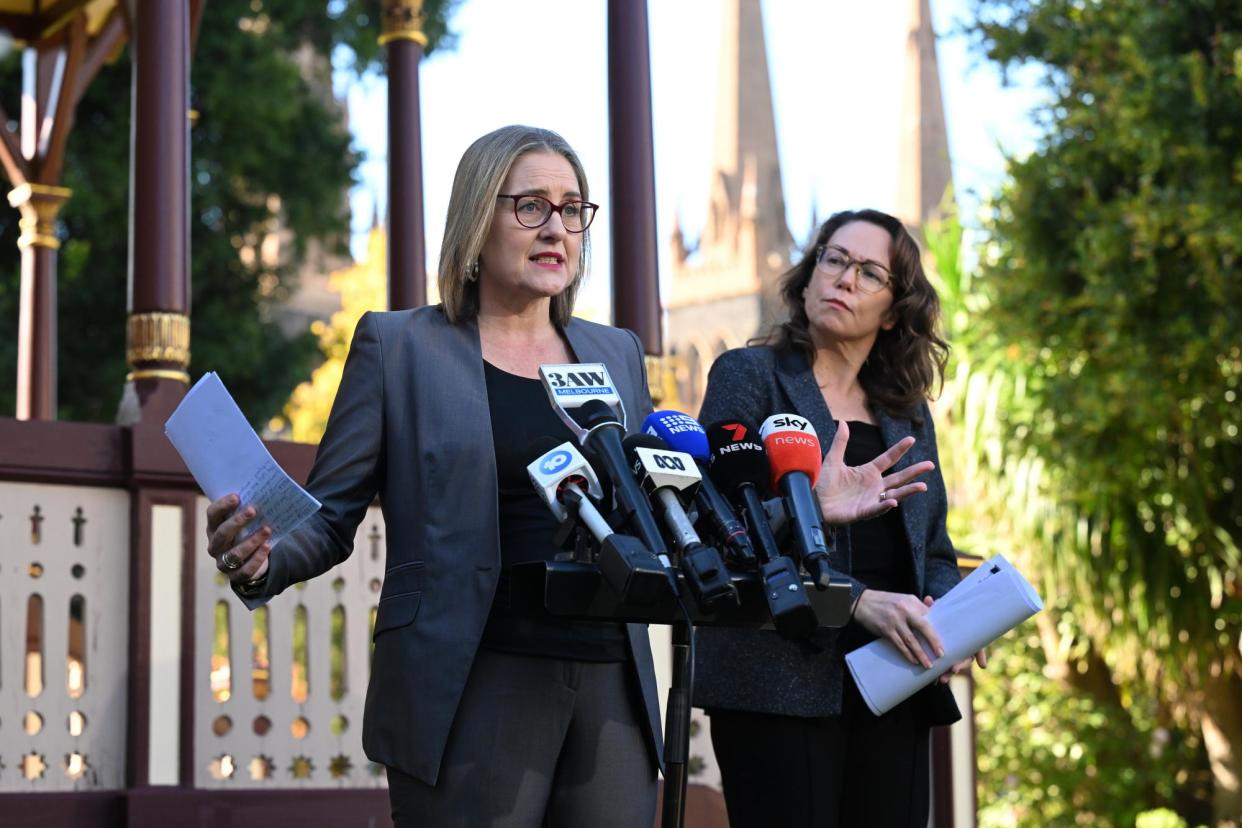Ballarat to be ‘saturated’ with ads in bid to stop violence against women after spate of deaths

Ballarat will be “saturated” in messaging to change the attitudes that drive violence against women in the wake of three killings.
Victoria’s premier, Jacinta Allan, announced Australia’s first “saturation model” to prevent the increasing scourge of domestic violence on Friday. It would include a widespread advertising campaign and the use of “influencers”, and was pitched as a four-year model to be tested in the regional city before being scaled up across the state.
It came after the government unveiled a family violence prevention package, which will include longer intervention orders for perpetrators and grant police power to issue longer family violence notices, which has drawn backlash from some advocates.
The government said Ballarat’s saturation model would be built on these reforms, and be informed by the latest research on domestic violence prevention.
“It’s evidence-led, it’ll be data-led, and most importantly it’ll be community-led, as we work at continuing to support not just the Ballarat community, but communities right across Victoria,” Allan told reporters.
The program would include efforts to counter harmful attitudes against women through social media and local influencers, and the strengthening of referral pathways between prevention programs and specialist responses to get help to people experiencing violence more quickly.
Prof Kate Fitz-Gibbon, the chair of Respect Victoria, told reporters at the announcement that it was a “gamechanging day”, amid a devastating year for women and children, particularly in Ballarat.
Fitz-Gibbon said the program could help a young person “receive the critical messages needed to change the underlying stereotypes and attitudes that we know drive violence against women”.
“It’s about making sure when you walk out on to the street, on public transport, we see those critical messages,” Fitz-Gibbon said. “When you turn on your TV, we’ve got the campaigns. When you go to your sporting club, women, girls, boys [and] men [will] have access to the same sporting equipment.”
Ballarat has become a key focus amid a national debate on ending violence against women after three women in the region – Samantha Murphy, Hannah McGuire and Rebecca Young – were allegedly murdered earlier this year.
Wendy Sturgess, the chief executive of Child and Family Services in Ballarat, said the program had the potential to help deliver long-lasting change in the community.
She said she was hopeful the plan would reverse a reduction of funding that the agency faced last year for its adolescence violence program.
“Almost 90% of kids [in out of home care] come from violent homes, and we’re not doing anywhere near enough to support those kids to break the cycle of violence,” she said.
On Thursday, the state government’s reforms to prevent family violence drew backlash from some in the DV sector, who warned the changes could be “dangerous” – without the right checks and balances – given perpetrators were adept at gaming the system by convincing police their victim is the aggressor.
The centrepiece of the $100m plan includes introducing a presumption of a minimum length for court-imposed family violence intervention orders. The government will also seek advice to strengthen sentencing guidance for order breaches, which range from a phone call to turning up at someone’s door in the middle of the night.
The government was yet to settle on the minimum order length, but the attorney general, Jaclyn Symes, said on Thursday that many advocates were pushing for it to be years or even longer.
“For many matters, six to 12 months is just not long enough and people want protection for much longer than that, if not for ever,” she said.
Kathleen Maltzahn, the chief executive of Sexual Assault Services Victoria, said details were thin but welcomed the justice reforms.
• In Australia, the national family violence counselling service is on 1800 737 732. In the UK, call the national domestic abuse helpline on 0808 2000 247, or visit Women’s Aid. In the US, the domestic violence hotline is 1-800-799-SAFE (7233). Other international helplines may be found via www.befrienders.org

 Yahoo News
Yahoo News 
